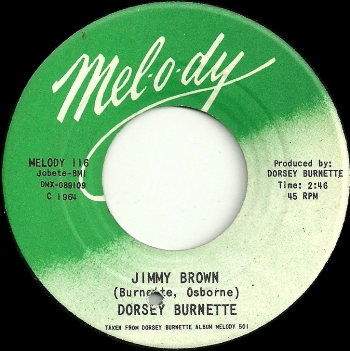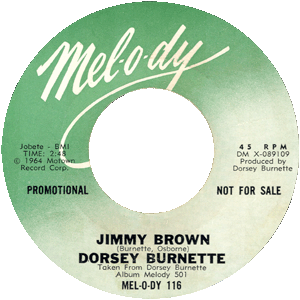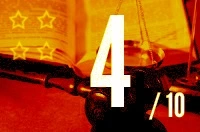Tags
 Mel-o-dy 116 (A), June 1964
Mel-o-dy 116 (A), June 1964
b/w Everybody’s Angel
(Written by Dorsey Burnette and Joe Osborn)
 Tamla Motown TMG 534 (A), October 1965
Tamla Motown TMG 534 (A), October 1965
b/w Everybody’s Angel
(Released in the UK through EMI/Tamla Motown)
 Less than a month after his Motown début 45 Little Acorn, rockabilly star Dorsey Burnette saw this hastily-arranged follow-up effort sent to DJs and record stores.
Less than a month after his Motown début 45 Little Acorn, rockabilly star Dorsey Burnette saw this hastily-arranged follow-up effort sent to DJs and record stores.
The out-of-sequence catalogue number suggests this was rush-released ahead of schedule, and Motown were keen on the record, even issuing it in Britain via the Tamla Motown imprint (the first time we’ve seen that here on Motown Junkies – quite a milestone!). The labels even proudly stated that Jimmy Brown came from “Dorsey Burnette Album Melody 501”, though such an album never actually materialised.
I’m guessing this confidence came about because Motown felt Jimmy Brown was more commercially acceptable than Little Acorn. It’s certainly more memorable, but the presence of two Dorsey Burnette singles released almost concurrently on an easy-to-ignore subsidiary label probably did him no favours; this made no impact at all in the marketplace.
Poor Dorsey; just like Little Acorn, this is far from awful. It’s sneakily likeable, in fact, and even though it’s by turns both weird and slightly annoying, it surely deserved a better fate.
It’s effectively a novelty riff on The Legend of John Henry’s Hammer, except that instead of a Stakhanovite industrial hero, the eponymous Jimmy is a musical visionary, a man who “could take anything and make music, anything that he found around the place”, and who was ultimately responsible for inventing the guitar.
 Like Little Acorn, it’s got a definite pop flavour about it, with a dash of comedy and decidedly country instrumentation. Because of the story, here the instruments themselves become the stars of the show; after each Dorsey-narrated verse describing how Jimmy constructed a particular instrument out of bits of whatever was lying around, the “chorus” is a burst of a repeated (and very catchy!) instrumental passage, played on that instrument – penny-whistle, tea-chest bass, guitar. Jimmy Brown: father of skiffle.
Like Little Acorn, it’s got a definite pop flavour about it, with a dash of comedy and decidedly country instrumentation. Because of the story, here the instruments themselves become the stars of the show; after each Dorsey-narrated verse describing how Jimmy constructed a particular instrument out of bits of whatever was lying around, the “chorus” is a burst of a repeated (and very catchy!) instrumental passage, played on that instrument – penny-whistle, tea-chest bass, guitar. Jimmy Brown: father of skiffle.
Dorsey delivers the whole thing in a low, guttural Southern drawl, something that was entirely absent from Little Acorn, and which makes me wonder whether he’s just putting on for comic effect here. His little chortle in the penultimate verse –
Everybody thought ol’ Jim (CHORTLE!) was crazy
But that’s how the git-ar was born
– is the vocal highlight, but it’s another likeable performance from Dorsey, whose avuncular enthusiasm makes you want to like his records even if they’re somewhat odd, as this one is.
It’s a good, solid tune, eminently whistleable, and Dorsey’s having plenty of fun with it; I don’t really understand it and I can’t see myself going back to listen to it again all that often, but it’s far from terrible.
MOTOWN JUNKIES VERDICT
(I’ve had MY say, now it’s your turn. Agree? Disagree? Leave a comment, or click the thumbs at the bottom there. Dissent is encouraged!)
You’re reading Motown Junkies, an attempt to review every Motown A- and B-side ever released. Click on the “previous” and “next” buttons below to go back and forth through the catalogue, or visit the Master Index for a full list of reviews so far.
(Or maybe you’re only interested in Dorsey Burnette? Click for more.)
 |
 |
| The Supremes “He Means The World To Me” |
Dorsey Burnette “Everybody’s Angel” |
DISCOVERING MOTOWN |
|---|
Like the blog? Listen to our radio show! |
| Motown Junkies presents the finest Motown cuts, big hits and hard to find classics. Listen to all past episodes here. |


I was being flippant in my last comment when I called this a great record, but in reality it’s not bad at all. The story-line is well conceived, and sometimes I even find myself humming the instrumental part. It did grow on me, and for some unfathomable reason I never thought it out-of-place that it was on the Tamla Motown label. Worth 5 or 6 when I’m in the right mood and the best Melody country record reviewed to date.
LikeLike
It is extremely catchy, that’s for sure, and I might have rated it higher on another day, if it wasn’t so palpably silly.
LikeLike
Dorsey was even moonlighting at this time–he produced Bob Regan and Lucille Starr’s LPs for A & M –one as the Canadian Sweethearts–the other a Lucille Starr solo effort which produced the minor French-Canadian hit –“The French Song” ( they had previously cut some killer rockabilly 45s for Ditto, Soma and King].
Dorsey was constantly label hopping [Imperial, Era, Dot, Reprise etc..all within’ five years] –occaisonally still writing the odd Ricky Nelson LP track . He may have struck gold with the right song –or even the LP had it been finished but tragedy struck during his time with Motown. His brother Johnny was tragically killed in a boating accident on August 30, 1964 in Clear Lake , California [ of course we all know what happened in another town called Clear Lake !!] He too had been having trouble keeping up. After his Liberty hits had died down he label hopped to Chancellor, [where ironically producer Jimmy Bowen had been hired by Frank Sinatra to work for him at Reprise–and signed Dorsey–also reuniting the two brothers to cut one last rockabilly single] Capitol and a label he helped co-found Sahara/Magic Lamp.
Needless to say, Dorsey was devastated by this and had no desire at this time to promote anything.
LikeLike
Indeed, and I’ll be touching on this the next time we meet him, but given Mel-o-dy’s track record I doubt even a fully-cooperative and fighting fit Dorsey could have done much with a record that wasn’t getting any plugging or distributor pull.
LikeLike
Also, I’m surprised thast Motown didn’t create a seperate publishing arm for material such as this [like the Stein and Vanstock name for MOR songs].
LikeLike
Little Acorn, despite sharing the same writers as this Jobete number, says “Saloon BMI” on the labels… What’s that about, then?
LikeLike
perhaps another Motown publisher..opnly used once??????
LikeLike
Not likely. I’ve never seen it listed under the Motown family of publishers:
Bengal. Fidelity, Jobete, Stein & Van Stock, etc. Most likely, part of the deal on this record production was that D. Burnette and Osborn got to keep the publishing rights to one side (of their choice)-for whatever reason. It seems that (according to at least a few sources) Dorsey Burnette had made his own deal, directly with Motown, while almost all the other Mel-o-dy artists had come in through Al Klein (no relation to me).
LikeLike
He was the only Mel-o-dy signing to (a) get a UK release, and (b) have any Motown singles after Mel-o-dy closed down, so there’s probably something in that.
LikeLike
Hello! I’m back. I kind of like this song. Dorsey definitely upped the “hick factor” in his voice for this one. Hope my friends at Motown Junkies are all doing well!
LikeLike
I always get Johnny and Dorsey confused. Correct me if i’m wrong but i think its Johnny Burnette who had “You’re Sixteen” in 1960 and Dorsey who had “Lonesome Train” in 1956. Am i right?
LikeLike
Yep, Johnny had “You’re 16” & several other pop crossover hits. He kind of moved from rockabilly into teen idol territory with the hits though they were well made records. “Lonesome Train” was actually by the Burnette Trio consisting of Johnny, Dorsey & their buddy Paul Burlison. Can you believe the Burnette boys met Burlison when they were all Golden Glove boxers?
LikeLike
I bought this on TMG534 in October 1965. I bought every TMG release in the 1960s when they came out, I loved Motown so much even then.
However, I had a few reservations about this before I played it. I wasn’t that familiar with Dorsey Burnette as he wasn’t played much on
UK radio, but I was aware of his brother Johnny who had several hits in the UK a few years earlier, and I knew Dorsey was unlikely to
be typical Motown. I couldn’t have been more disappointed when I heard this utterly banal recording. This is just about as poor a song
as anybody could compose. I played it a total of three times just to see if it would improve, but alas no. Most definitely
the worst TMG release up to 1973. I can’t say after that, because that’s when I stopped buying new music. I didn’t hear again until
2007 when I got ‘The Complete Motown Singles 1964’ CD set, when I thought I’d try it again, but unlike many recordings it hadn’t improved
with time. It’s simply awful. Normally, when I disagree with the reviewer’s comments I find I would allocate a higher mark, but on this
occasion I would definitely give a lower mark (1/10). How can this possible warrant the mark you gave it? There’s hardly an melody, and
the lyrics are only suitable for the under fives. Anyone could write a song of this poor standard. I also don’t care for Dorsey’s voice,
but of course that’s just my opinion. But anyone who rates this as a quality song needs their head examined. This is the sort of song
Wally Whyton used to sing to Pussycat Willum on ‘Small Time’ back in the late 50s early 60s. (American readers wont know what I’m talking
about, but this was a UK TV program for the under fives where a guy with a guitar sang nursery type songs to a puppet cat). That’s
where this recording belongs, in a Kintergarten!!!!
LikeLike
Yeah this record overdoes the hick factor. But for some reason I enjoy hearing it every now & then. Not a great “Motown record” by a long shot. Dorsey did an interesting song a few years before for another label called “Tall Oak Tree”. That was probably the earliest known song to mention the environment. Cheers!
LikeLike
That’s an interesting point. Perhaps he did have some talent after all. I don’t know the song you mention, it wasn’t a hit in the UK, but I’ll see if it’s on YouTube and give it a try. I know he wrote ‘Sad Boy’ which Stevie recorded and although no classic, is certainly a better song than either ‘Jimmy Brown’ or ‘Everybody’s Angel’.
LikeLike
For us Yanks that would be like Capt Kangaroo
LikeLike